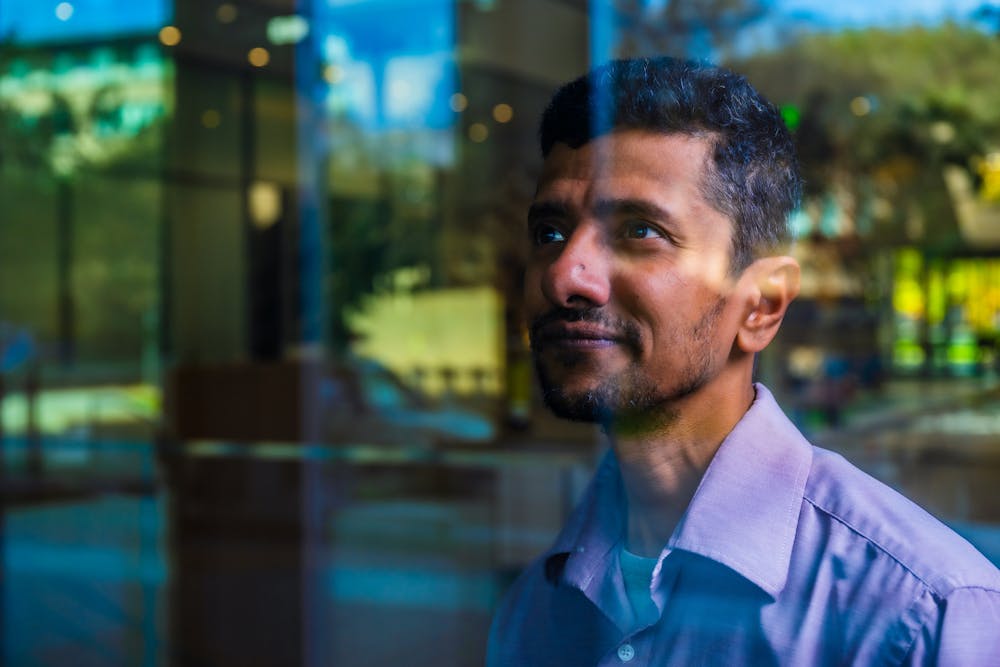Veeraraghavan receives O’Donnell Award for engineering research

Ashok Veeraraghavan, a professor of electrical and computer engineering, was awarded the 2024 Edith and Peter O’Donnell Award for “revolutionary imaging technology,” and will be recognized Feb. 6.
The Texas Academy of Medicine, Engineering, Science and Technology awards the Edith and Peter O’Donnell award to a Texas researcher “addressing the essential role that science and technology play in society” annually.
According to program director Stephanie Shaw, TAMEST award recipients present their research to conference attendees and receive a $25,000 honorarium and medal. Recipients are chosen from nominations and the finalist is selected with consideration from National Academy members and a committee of Texas Nobel and Breakthrough Prize Laureates.
“[The award is a] pathway to National Academy recognition, and I hope this assists [Veeraraghavan] in progressing his research and continuing his innovative and transformative work,” Shaw said.
Veeraraghavan credits the efforts of his entire lab for the award.
“It really is a recognition of the hard work, the creativity and the innovation done by an amazing group of graduate students and postdoctoral researchers at my lab in Rice,” Veeraraghavan said.
Vivek Boominathan, a postdoctoral research associate working on lensless imaging technology alongside Salman Khan, wrote in an email to the Thresher describing how the lab designed miniature cameras.
“Such cameras will have applications as wearables, can be implemented under the skull to study brain functions, and as eyes for micro-robots and endoscopes. We achieved this feat by completely redesigning the cameras by replacing traditional lenses with custom light-modulating flat masks placed on the imaging sensor. Instead of focusing light to create an image, we use computational techniques to re-focus the image from the camera measurements,” Boominathan said.
Mel White, a postdoctoral research fellow working on LiDAR, said that the collaborative environment in the lab helps them innovate to design complete imaging systems.
“We needed expertise across the full pipeline to make this work a reality — in optics, compressed sensing, integrated circuit design, CMOS fabrication and computational modeling,” White wrote in an email to the Thresher. “For me, this is why it’s so exciting to work with [Veeraraghavan]’s group: Our team is uniquely inter- and intra-disciplinary, and highly collaborative, which lets us design complete imaging systems from photon to transistor. We aren’t constrained to off-the-shelf parts or existing models; our imagination is the only limit.”
Haiyun Guo, a third-year Ph.D. student, and Boominathan worked on NeuWS technology to modify the original WS technology.
“Existing methods can image through scattering media and other obscurants by wavefront shaping methods using high-resolution spatial light modulators — but previous work generally requires guidestars, controlled illumination, point scanning and/or statics scenes and aberrations,” Guo wrote in an email to the Thresher.
Guo said that in collaboration with University of Maryland, they “introduce neural WS, a WS technique that can computationally correct for severe time-varying isoplanatic aberrations without a guidestar.”
Luay Nakleh, the William and Stephanie Sick Dean of Engineering and professor of computer science and biosciences, said 2024 is the second year in a row professors in the school of engineering have received the O’Donnell Award.
“Last year we had Professor Jaime Padgett, the Chair of Civil and Environmental Engineering recieve [the award],” Nakleh wrote in an email to the Thresher. “We do not work for recognition, but we value recognition and it is important that our faculty receives them. Great work does not happen over losing sleep over wondering whether you will get an award, [it] happens because you are passionate about it. [It] is important for the students to know that they shouldn’t chase recognition, chase quality and your passions.”
Ramamoorthy Ramesh, the vice president of research, stated that one of DesRoches’ goals is to expand research in the areas of energy, environment, climate change, urban dynamics, health sciences, AI technology and data sciences.
“[We are] investing more into research,” Ramesh wrote in an email to the Thresher. “[This recognition will] help grow our graduate and undergraduate programs.”
“Don’t work for the recognition,” Nakleh wrote. “Recognition comes when you do great work.”
More from The Rice Thresher

Rice to support Harvard in lawsuit against research funding freeze
Rice, alongside 17 other research universities, filed an amicus curiae brief in support of Harvard University’s lawsuit against the Trump administration over more than $2 billion in frozen research grants.

Mayor Whitmire discusses ‘the state of Houston’ between audience protests at Baker Institute
John Whitmire’s remarks on the city’s budget, transportation and infrastructure were interrupted twice by shouts from audience members at a Baker Institute event May 29. At the event, which was open to the public, Whitmire spoke about the current state of Houston alongside former county judge Ed Emmett.
Rice reaffirms support for international students after Trump administration targets Harvard
Rice and the Office of International Students and Scholars said in a May 23 email that they are monitoring the Trump administration’s actions towards Harvard to bar the school from enrolling international students. A federal judge temporarily halted the move less than 24 hours later.


Please note All comments are eligible for publication by The Rice Thresher.